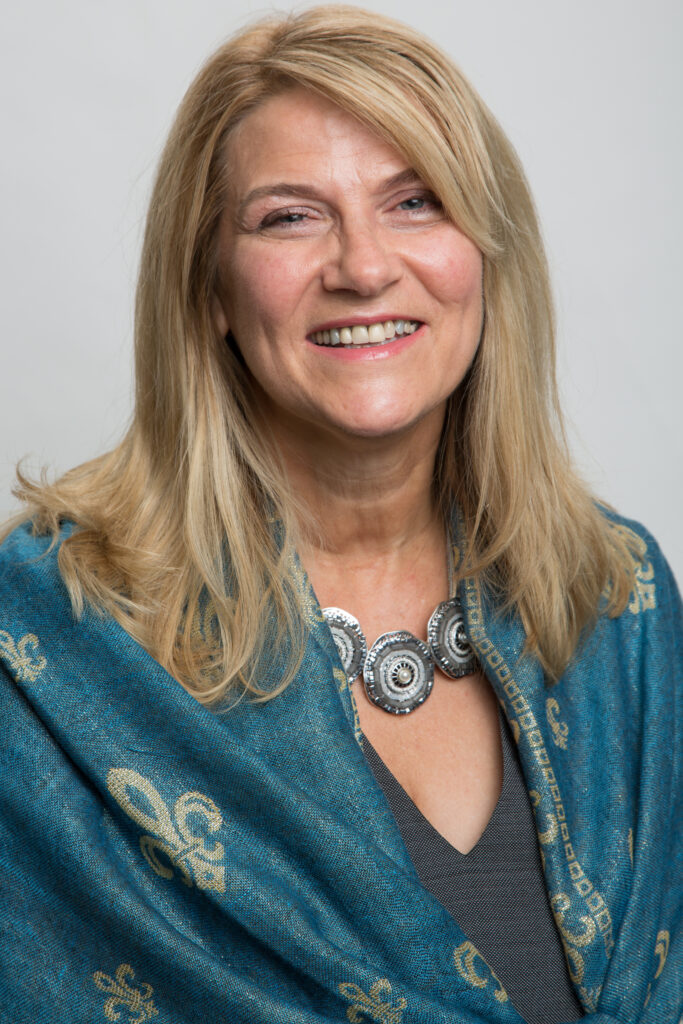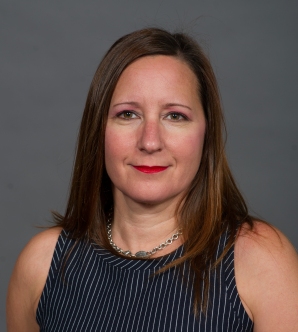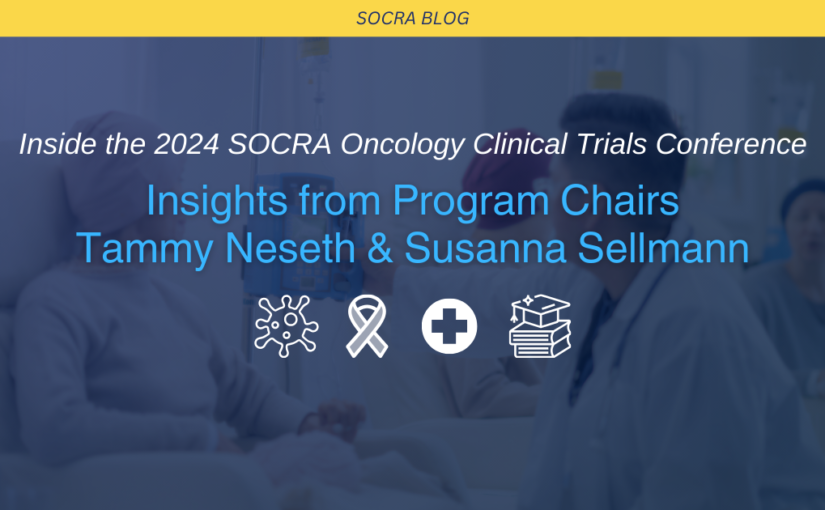
Tammy Neseth
MA, CCRP, CIP

Susanna Sellmann
RTT, BS, CCRP
Oncology Clinical Trials Conference I March 13-15, 2024 I San Antonio, TX
As the winter chill envelops much of North America, a warm and exciting opportunity awaits oncology clinical trial professionals. SOCRA’s annual Oncology Clinical Trials Conference is set to brighten San Antonio, TX this March. This pivotal event, co-chaired by 2023 SOCRA President’s Award Winner Tammy Neseth, MA, CCRP, CIP, and SOCRA Past-President, Susanna Sellmann, RTT, BS, CCRP, has evolved into an indispensable resource for oncology-focused clinical trials knowledge, networking opportunities, and avenues for professional growth.
In a recent conversation with Tammy and Susanna, they shared their insights into the conference’s inception, evolution, and what attendees can expect.
Q: What was the inspiration behind creating the Oncology Clinical Trials Conference?
TN: The idea was sparked in 2015 during a SOCRA board meeting. We were discussing course offerings and realized the absence of an oncology-focused conference. Susanna and I, seated together, felt a strong drive to fill this gap. Our vision was rooted in addressing the specific needs of oncology clinical trial coordinators.
Q: How has the conference grown since its inception?
TN: Initially, it was only a two-day event with volunteer subject matter experts sharing their expertise. The first conference exceeded our expectations with over 120 attendees. It was fabulous! Later, we introduced a poster program and, more recently, two pre-conference workshops on oncology research fundamentals and Good Clinical Practice (GCP), both excellent for those new to the field.
SS: The addition, the poster program, offers an excellent opportunity to participate in this conference. It allows participants to demonstrate leadership and actively contribute to the field. Recognizing that some may not be able to attend solely for learning, the poster program will enable participants to attend and directly engage with key topics, peers, and industry experts. They can showcase their work on diverse themes such as process improvement, patient-oriented research, recruitment strategies, and other hot topics.
Q: What are some unique challenges in oncology clinical trials, and how does this conference address them?
SS: Oncology trials present unique challenges that differ significantly from other areas of clinical research. A primary challenge is that we often work with patients who are in advanced stages of cancer, where standard treatments have failed. These patients are typically navigating through a complex medical journey, having exhausted first-line, second-line, and even third-line therapies. With Phase I trials in oncology, we’re introducing new investigational therapies, such as immunotherapies, which bring their own variables and unknowns.
This conference tackles these challenges head-on. We focus on critical aspects like the Common Terminology Criteria for Adverse Events (CTCAE), an essential system for categorizing and grading the side effects of cancer treatments. Understanding the CTCAE is vital for ensuring patient safety and the integrity of trial results. We also strongly emphasize response criteria in solid tumour trials, which are crucial for accurately measuring and interpreting tumor responses to new treatments, often through various imaging techniques.
To further address the complexities of oncology trials, we incorporate a lot of practical, hands-on training. In our pre-conference workshops, which can serve as ‘Oncology 101′, attendees learn about standard of care chemotherapy, in combination with surgery and or radiation therapy, and the different timepoints at which they are delivered. The approach to care is multidisciplinary involving diverse caregivers. This was a gap in training that I was excited to help fill. We aim to enhance trial coordinators’ and other professionals’ understanding and skills by offering in-depth sessions, case studies, and practical examples. Our goal is to equip attendees to manage these complex trials effectively, promoting the best possible outcomes for patients and advancing the field of cancer treatment.
Q: Can you talk more about the role of networking at the conference?
TN: Networking has become increasingly integral at our conference. I love facilitating connections among attendees, especially in the smaller pre-conference workshop groups. We’re adding more networking opportunities this year, like icebreaker games and social events, to foster stronger connections and camaraderie among attendees. These interactions often lead to lasting professional relationships. If you’re looking to connect in this growing field – especially if you’re coming alone – this is the place! On the other hand, if you prefer to focus primarily on absorbing the comprehensive information from the sessions without a strong networking component, that option is also available.
Q: What are some notable highlights on the agenda this year?
TN: This year’s agenda is truly diverse and packed with engaging sessions from experts who are passionate about their fields. We will cover a wide range of topics, including working with sponsors, budgeting, and patient-centered approaches. Our speakers are subject matter experts eager to share their expertise.
We’ve introduced several new sessions that I’m excited about. For example, Dr. Scott Okuno will discuss Response Evaluation Criteria in Solid Tumors (RECIST). Jeff Doi’s session on pharmacokinetics, pharmacodynamics, and drug interactions promises to be enlightening. Dr. Jay Mandrekar, a biostatistician, will cover the basic principles of clinical trial design on day two. His ability to clarify complex data concepts is remarkable! Additionally, Dr. Stuart Bentley-Hibbert’s talk on imaging in clinical trials and Dr. Mark McDonald’s session on proton beam therapy as an alternative to conventional radiation therapy are not to be missed. Personally, I’m particularly looking forward to Erin Lynch’s talk on regulatory considerations in oncology research and Audrey Davis will be joining us this year to share her expertise on how we can improve the research participant experience.
SS: I eagerly anticipate the session Vanessa Speers will present on quality specimen management, an essential yet often underappreciated topic. Like many talks, this session will offer practical insights that attendees can immediately apply. Andrea Skafel’s talk on the basics of oncology research, and the case study in the pre-conference workshops, are essential and allow practical hands on practice for newcomers. They provide a solid foundation for understanding the complexities of oncology research.
Q: Why should readers attend this conference?
TN: This conference is a vital platform for both learning and networking. It’s tailored for everyone, from newcomers to seasoned professionals, to ignite passion and expand knowledge. Attendees get to engage with a diverse group of clinical research professionals, including those deeply involved in specialized areas like blood processing. It’s also an excellent opportunity for professional development. The pre-conference workshops are designed for beginners, while the main sessions cater to experienced professionals – yet everyone is welcome to all sessions. Attendees often leave feeling reenergized and inspired, making it a perfect event for anyone feeling burnt out in the field.
SS: With the increasing complexity of oncology clinical trials, staying informed and updated is more important than ever. This conference is an essential platform for this, making it an annual must-attend event for anyone in the field. Considering the recent shifts in the workforce post-Covid, we have tailored this conference as a crucial resource, offering essential training and support to the influx of new clinical research professionals to this field. We focus on delivering insights into the current research environment, highlighting the latest practices, such as new study designs like basket, umbrella and pragmatic trials. Attendees can expect to receive the most recent updates, which are imperative for keeping pace with the rapidly evolving nature of oncology trials.
Thank you, Tammy and Susanna, for your contributions, and for leading the charge in organizing this crucial conference for oncology clinical trial professionals! Your dedication to advancing the field through this platform is truly commendable. We look forward to an enlightening and informative conference with engaging sessions, expert speakers, and valuable networking opportunities.
For those interested in attending this transformative educational experience, we invite you to join us from March 13-15, 2024, in the vibrant city of San Antonio. This is an opportunity not to be missed for anyone looking to expand their knowledge, connect with peers, and stay at the forefront of oncology clinical research. For more details about the Oncology Clinical Trials Conference, including registration and poster program information, please don’t hesitate to contact our team online or call (215) 822-8644. We look forward to welcoming you to a conference that is set to shape the future of oncology clinical trials!

This Oncology Clinical Trials Conference in San Antonio is a valuable opportunity for professionals to learn, network, and stay updated on the latest in oncology research. With expert speakers and diverse sessions, it’s a must-attend event for those in the field.